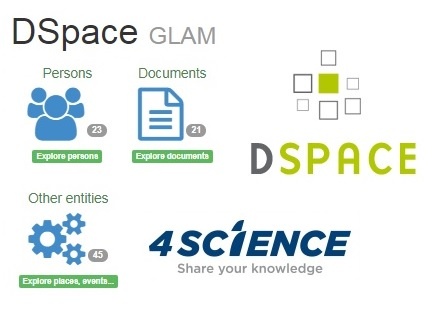DSpace-GLAM based on DSpace-CRIS : Manage, Analyze & Preserve your digital heritage
09/10/2017


DSpace-GLAM (Galleries, Libraries, Archives, Museums) is the Digital Library Management System based on DSpace and DSpace-CRIS (Current Research Information System).
DSpace-GLAM is developed by 4Science Team aiming to fill cultural heritage institutions needs regarding the management, analysis and preservation of digital cultural heritage. In particular :
The 4Science Team …
|
is focused on international collaboration and sharing to develop, integrate and promote the adoption of technological standards and open source solutions (with a set of services) on support of the life of a digital project. |
By promoting support Open Source projects and communities, and the use of international standards and cutting-edge technologies, 4Science helps you make your data, information and digital resources meaningful.
In the Big Data Age, Digital Library Management Systems have to forcefully enter the research process to manage both qualitative and quantitative aspects of Digital Cultural Heritage and allow researchers also to analyze data, highlighting and enhancing their relationships at different scales.
Therefore the flexibility of the Data Model and the availability of tools for analysis and interpretation become fundamental features for such systems.
To face these challenges, the 4Science Team has developed DSpace-GLAM - an additional open-source configuration for the DSpace platform - that not only includes functionalities of DSpace-CRIS (Current Research Information System) but is also trying to cover cultural objects in the era of Big Data.
DSpace-GLAM Data Model …
|
… extends the DSpace Data Model providing the ability to manage, collect and expose Data about every entity important for the cultural heritage domain, such as Persons, Events, Places, Concepts and other entities. |
Due to its extensible Data Model, DSpace-GLAM is able to manage different metadata standards, according to different projects needs (from Dublin Core / DC to LIDO to hierarchical archival standards, such as Encoded Archival Description / EAD).
If you already have DSpace-CRIS installed, the best way to integrate it with GLAM is not to download DSpace-GLAM, but to improve the CRIS data model, adding the further entities useful to your needs (events, places, concepts and so on).
Currently, the 4Science Team is working on an out-of-box compliance with Europeana for DSpace-GLAM (through mapping DSpace DC elements to Europeana Data Model / EDM).
|
Explore DSpace-GLAM features, using this public demo For more information contact 4Science Team Join DSpace Entities Working Group (In order to integrate IRs with CRIS, we need more accurate information which would result in to provide metrics, reports, develop integrations and services ...) |
Related :
- DSpace for Data: issues, solutions and challenges (DuraSpace recorded webinar)
- The DSpace Community Annual Report 2017 – July 2018
- DSpace-CRIS : the first free open-source extension of DSpace for the Research Data and Information Management
- DSpace default configuration (GitHub)
- DSPACE ADD-ONS (with already integrated fully Open Source Modules : CKAN Integration : Add Research Data Management features to your DSpace)
- Various metadata customization and configuration options that are available within DSpace for the Item Submission user interface
- One way of moving a Collection to a different DSpace Community (a dspace-community thread). Video: Another way is to simply recreate the Collection in the new location (which will change the Collection's URL/Handle) and move all the Items into the new Collection, using Batch Metadata Editing.
- The Open Journal Systems (OJS) is a journal management and publishing system to expand and improve access to research
- DSpace-CRIS 5.8 and ORCID v2 API support release announcement
- Standardizing Data Management and Data Governance Services (Metadata Management also has a life cycle that needs to be aligned with Project Management, transformation and risk management lifecycle stages. But ...)
- Hidden Costs of Poor Data Quality
- 4Science : Share your Knowledge for tomorrow's Science (AIMS blog entry)
- 2016 Open Source Yearbook
- EAD3 standard to codify archival data: some news and many confirmations
